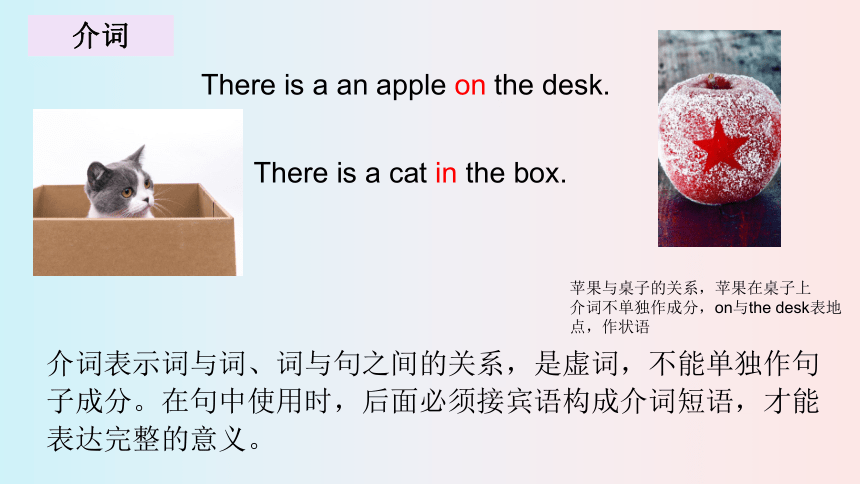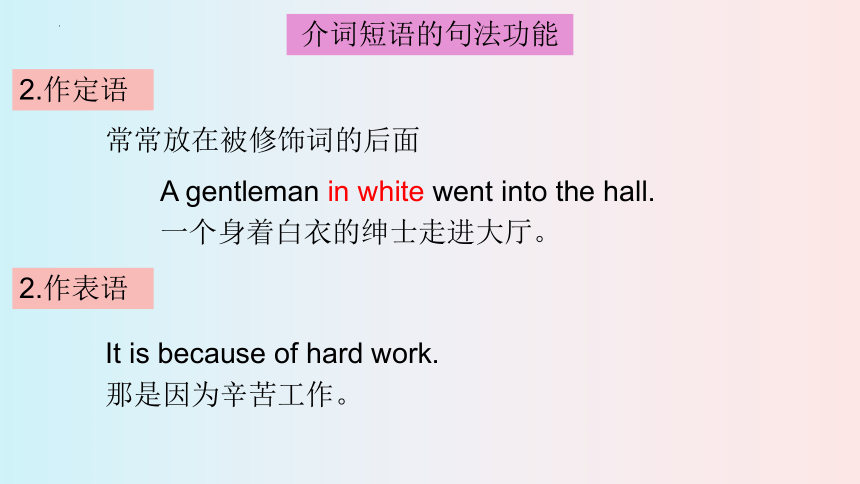2023届高考英语复习连词 介词 课件(60张PPT)
文档属性
| 名称 | 2023届高考英语复习连词 介词 课件(60张PPT) |  | |
| 格式 | pptx | ||
| 文件大小 | 1.5MB | ||
| 资源类型 | 教案 | ||
| 版本资源 | 通用版 | ||
| 科目 | 英语 | ||
| 更新时间 | 2022-11-05 10:46:41 | ||
图片预览












文档简介
(共60张PPT)
连词和介词
Galya
PART 01
介词
介词的定义
介词的句法功能
There is a an apple on the desk.
There is a cat in the box.
介词
介词表示词与词、词与句之间的关系,是虚词,不能单独作句子成分。在句中使用时,后面必须接宾语构成介词短语,才能表达完整的意义。
苹果与桌子的关系,苹果在桌子上
介词不单独作成分,on与the desk表地点,作状语
介词是一种用来表示词与词、词与句之间的关系的虚词,在句中不能单独作句子成分。在句中使用时,后面必须接宾语构成介词短语,才能表达完整的意义。介词短语在句中常作状语、定语,表语或宾语补足语。
介词短语的句法功能
可作时间、地点、方式、条件、原因等状语,修饰动词或整个句子,置于句首、句中或句末均可
Don’t touch it with your hand.(作方式状语)
别用手去摸它。
We go to school by car everyday.(作方式状语)
我们每天乘汽车上学。
In case of fire,ring the alarm bell.(作条件状语)
如遇火灾,即按警铃。
1.作状语
介词短语的句法功能
常常放在被修饰词的后面
A gentleman in white went into the hall.
一个身着白衣的绅士走进大厅。
It is because of hard work.
那是因为辛苦工作。
2.作定语
介词短语的句法功能
2.作表语
In short,he is one of the most promising students I've ever known.
总之,他是我认识的最有希望的学生之一。
I found everything in good condition.
我发现一切正常。
4.作补语
介词短语的句法功能
5.作独立成分
常见介词用法
时间介词
1.in, on, at
in+较长的时间,如:世纪、朝代、年、季节、月份以及泛指上午、下午、晚上
in the 1950s 在20世纪50年代
in summer 在夏天
in one’s thirties 在某人三十多岁时
in the morning/afternoon/evening
on+具体的某一天或某一天的上午、下午或晚上
on May 1st 在五月一日
on Monday 在星期一
on a cold night 在一个寒冷的晚上
on Saturday afternoon 在星期日下午
1.in, on, at
at+某一时刻或较短的时间
at 3:20 在三点二十分
at this time of year 在一年的这个时候
at noon 在中午
at this moment 在这一刻
at the end of... 在......末尾
1.in, on, at
in+较长的时间,如:世纪、朝代、年、季节、月份以及泛指上午、下午、晚上
on+具体的某一天或某一天的上午、下午或晚上
at+某一时刻或较短的时间
1.in, on, at
24小时黄金法则
0
24h
时刻点
at
at noon 在正午
at night 在晚上
at dawn 在黎明
at dust 在黄昏
on
in the morning/evening/afternoon
in
in与after的用法区别
in+一段时间 表将来 She will come back in three days.
她三天后会回来。
after+一段时间 指过去 He returned after five months.
他五个月后回来的。
after+将来时间点 表示将来 某一时刻之后 She will appear after five o’clock.
五点之后他会到达。
时间名词前有last, next, this, that, these, those, some, any, every, each等词时,前面不用介词。
类似的时间状语还有:
last Sunday, that morning, these years...
注意
I will go to Shanghai next in week.
下周我将要去上海。
I will go to Shanghai next week.
下周我将要去上海。
一、时间介词
2.for, from, since
for+时间段,表示行为或状态持续多久
Mr.Brown lived in the country-side for almost fifteen years
after his retirement.
布朗先生退休后在乡村生活了差不多15年。
from+时间点,表示行为或状态的起始点,而不涉及其持续时间的长短
My younger sister began, to learn to dance from the age of five.
我的妹妹从5岁开始学习舞蹈。
since +时间点,不仅表示行为或状态的起始点,而且还强调该
行为或状态从起始点一直持续到说话的时刻,通常与延续性动词的现在完成时连用
Tom has been doing his homework since seven o'clock.
汤姆从7点开始就一直做他的家庭作业。
since还可以用作连词,引导时间状语从句,从句常用一般过去时,主句用一般现在时或现在完成时。
It has been a year since I visited my teacher last time.
自从我上次拜访我的老师到现在已经一年了。
一、时间介词
2.for, from, since
一、时间介词
3.during, over, through
during “在……期间”,指某个动作或状态在某个时间段里或整个过程中断断续续地发生过多次,或在整个时间段里的某一点发生过,起止时间比较明显
He often falls asleep during the class.
课堂上他常常睡着。
一、时间介词
3.during, over, through
over“在(做)……期间”,over还有“贯穿(一段时间)”的意思,相当于during
We had a pleasant chat over a cup of tea.
我们一边喝茶一边愉快地聊天。
through “在……期间;从……开头到结尾”(所指时间包括在内,此时与throughout相同)
Tom bore up well underthe strain of supporting his family through his father's illness.
在他父亲生病期间,汤姆坚强地承担了养家的压力。
一、时间介词
3.during, over, through
一、时间介词
4.by, before, until/till
by+接时间点,表示“不迟于某时”,包括某时,表示“在……期间”
Can you return the book by Monday
你能在星期一之前还书吗?
to travel by day/night 自天/夜间旅行
before+时间点,表示“早于,在某时之前”,不包括某时
Several months before our trip,Wang Wei and I went to the library.
在我们旅行之前的几个月,我和王伟去了图书馆。
一、时间介词
4.by, before, until/till
till/until 表示“直到……时候”,until比 till更正式。谓语动词须是延续性动词的肯定式或短暂性动词的否定式。not...until...“直到……才……”
I have to wait until 1l o'clock.
我不得不等到11点。
Don't open it until your birthday.
等到你过生日那天再打开。
一、时间介词
4.by, before, until/till
二、地点、方位介词
1.表示“上/下”
意义 垂直 不垂直 相接触
在......之上 over above on
在......之下 under below beneath
over
under
above
below
on
beneath
二、地点、方位介词
2.in, on, to
in
on
to
Jilin lies in the northeast of China.
Russia lies on the north of China.
South Korea is to the northeast of China.
在......范围之类
毗邻,接壤
在......范围之外
不接壤
二、地点、方位介词
2.in, at
in+大地点——国家、省份、城市等
at+小地点——学校、家里、车站等
He arrived in Shanghai yesterday.
He arrived at the station at ten.
三、方向介词
三、方向介词
across, through, over
三、方向介词
across+表面表示横过
through+空间表示穿过、贯穿
over表示从上面越过
He can swim across the river.
他能游泳过河。
They walk through the forest。
他们步行穿过了森林。
The airplane flies over the roof of the house.
飞机飞过了屋顶。
by 表示交通方式 by air, by plane, by bus
“按......算” by the year/day/hour,
by the pound/ton
通过......(方式/手段) by phone/email,
by hard work
四、表示工具、方式、手段的介词
1.by
2.with
with with+有形的工具或身体某些器官 with a pencil=in pencil
with our eyes/ears/legs
with+表示情感态度的名词 with satisfaction
with permission
四、表示工具、方式、手段的介词
3.in
in 用于语言/原料/颜色/情绪等词之前 in English, in ink,
in high spirits,
in surprise
四、表示工具、方式、手段的介词
4.固定短语
by hand 手工
on the radio 通过广播
in this/that way 用这种/那种方试
by this/that means 用这种/那种方式
with this/that method 用这种/那种方法
四、表示工具、方式、手段的介词
except, besides, except for
except表示“除A之外不再有”前面常有all,every。
besides表示“除A还有”前面常有other,another。
except for排除不是一类的。
All the students go out except Tom.
除了汤姆,所有的学生都出去了。
Besides you, I have a few friends.
除了你,我还有几个朋友。
I had nothing on except for my socks.
我除了短袜什么都没穿。
表示“除了”的介词
except 除......外 指整体里面排除部分,其宾语为前面的整体概念词的同类语(一类人或物)
except for 除了 表示除去整体中的一部分,指对非同类事物的排除,它所叙述的事实或细节部分修正了句子的主要意思
besides 除......之外(尚有) 句中常有other, the others, also,else等词,相当于in addition to
apart from 除......外(都) 除......外(尚有) 可用来替换besides, except, except for等
between与among的用法
between 在......之间(指两者)
常和and连用
among 在......之间(指三者或三者以上)
The building stands between the park and the small river.
那栋楼位于公园和小河之间。
We'll visit a town among the mountains.
我们将要参观一个被群山环绕的小镇。
常考介词
1.with的用法
和......一起,和,同,跟
Put this bag with the others.
把这个包和其他的包放在一起。
随着(表示同时或同一方向)
Temperatures vary with the time of the year.
温度随时节而变化。
用(表示方式)
What will you do with the tool
你会用这件工具做什么?
常考介词
1.with的用法
具有,带有
The waiter arrived with a cup of coffee.
服务员端着一杯咖啡来了。
由于,因为
Seeing the dog,he trembled with fear.
看到这只狗,他吓得发抖。
常考介词
2.of的用法
表示所属关系“......的”(of短语作定语)
This is the house of my brother.
表示事物的性质
a story of adventure 冒险故事
He is just a boy of ten.
表示动宾关系
a waste of time 浪费时间
the discovery of America 美洲的发现
of(+great/much)+抽象名词=同根形容词
It is of great value.=It is very valuable.这非常有价值。It is of no help.=It is not helpful.这没有帮助。
用于“It betadj.+of +
sb.to do sth.”结
构中 (sb.与形容词是
逻辑上的主系表关系,常
见形容词:kind,
good,nice,clever,
foolish,polite等。)
It was rude of him to say so. =He was rude
to say so.
他这么说太粗鲁了。
It is very kind of you to help me out.
=You are kind to help me out.
你能帮我真是太好了。
常考介词
3.by的用法
(时间)不迟于,
在……之前
(位置)靠近,在……
旁边/附近
The documents need to be ready by next Friday.
文件需要在下周五前准备好。
On a cold evening,it is pleasant to sit by the
fire. 在寒冷的夜晚,坐在炉火旁边很舒服。
表示标准、度量、数
量,意为“根据,按
照,以……计算”
(表示程度、数量)
增减的幅度
Parcel post is charged by weight and mileage,
without reference to contents.
包裹邮递按重量和里程收费,不管所装何物。
by the hour 按小时计算,by the kilo 按干克计算
The price of oil fell by a further 2 dollars a
barrel.
油价每桶又下降了两美元。
经过,经由
靠,用,通过(某种
方式、手段)
He walked right by me without even saying hello.他径直从我身边走过,甚至连招呼都不打。
You can reserve the tickets by phone.你可以通过电话订票。
常考介词
4.for的用法
为了(表示目的、对象、用
途等)
(表示时间、距离、数量)
达;计
books for children 儿童读物
It's time for class.上课时间到了。He plays basketball just for fun.他打篮球只是为了消遣。
We have stayed here for two months.
我们已经在这里待了两个月了。
因为;由于(表示原因)
换取(表示等值交换)
He paid forty yuan for the book.他花40元买了这本书。
He was arrested for attempted murder.他因谋杀未遂而被捕。
常考介词
5.against
反对;违背;
与·…相反
紧靠;倚靠
与……竞争
Are you for or against the plan
你赞成还是反对该计划?
Tired,Jim was fast asleep with his back against a big tree.
吉姆累了,背靠着一棵大树很快便睡着了。
We will be competing against the best companies in Europe.
我们将会和欧洲的顶级公司竞争
以……为背
景,衬托
防备,抵御
The hill looks more beautiful against the blue sky.在蓝天的映衬下,山丘更显美丽。
。They took measures against the fire.
他们采取了防火措施。
常考介词
6.beyond
(在空间上)在……的那一
边,远于
(
超出;(指可能性、理解力、
能力等)非……可及
时间)在……以后;迟于
The disco went on until beyond midnight.
迪斯科舞会一直持续到午夜以后。
The whole problem was quite beyond him.
整个问题他根本无法理解。
The airport is 20 miles beyond the town.
机场在离城镇二十英里外的地方。
(七)有些名词与介词的同定搭配有些名词 answer,key,entrance,introduction,access,approach,attitude,note,visit,apology,journey,monument,devotion等常与介词to 连用。e.g. He thought that the key to feeding people was to have morerice and to produce it more quickly.
他认为养活世人的关键是更多、更快地生产水稻。
We praise him for his devotion to duty. 我们赞美他的忠于职守。
介词易混易错点
(一)英汉差异造成的介词错用1.不该用介词的短语中用了介词“在明年”用next year,而不是 in the next year;
“进入房间”应为enter the room,而不是enter into the room;
“还书”应为return my book,而不是return back/to my book;
“为人民服务”应为serve the people,而不是 serve for the people.2.错用介词“与某人结婚”应为get married to sb.,而不是 get married with sb.;"和……不同”应为 be different from,而不是 be different with;“墙上凿洞”应为make holes in the wall,而不是 make holes on the wall.
(二)有无介词,词汇意义不同know sb.认识某人→know about sb.了解某人
shoot sb. 击中某人→shoot at sb. 向某人射击
search sb. 搜身→ search for sb. 搜寻某人believe sb. 相信某人的话→believe in sb. 信任某人的人格benefit sb. 使某人受益→benefit from sb. 从某人那里得到益处
(三)其他易混短语
the article in the newspaper 报纸上的文章 birds in the tree树上的鸟apples on the tree 树上的苹果 tickets for/to the concert音乐会的票in the direction of...着.…..的方向 set an excample to sb.为某人树立榜样
拓展:to,at介词辨析
at sb.与动词连用,表示攻击的目标;
laugh at sb.嘲笑某人
to sb.只表示方向,没有恶意;
turn to sb. for help求助某人
连词和介词
Galya
PART 01
介词
介词的定义
介词的句法功能
There is a an apple on the desk.
There is a cat in the box.
介词
介词表示词与词、词与句之间的关系,是虚词,不能单独作句子成分。在句中使用时,后面必须接宾语构成介词短语,才能表达完整的意义。
苹果与桌子的关系,苹果在桌子上
介词不单独作成分,on与the desk表地点,作状语
介词是一种用来表示词与词、词与句之间的关系的虚词,在句中不能单独作句子成分。在句中使用时,后面必须接宾语构成介词短语,才能表达完整的意义。介词短语在句中常作状语、定语,表语或宾语补足语。
介词短语的句法功能
可作时间、地点、方式、条件、原因等状语,修饰动词或整个句子,置于句首、句中或句末均可
Don’t touch it with your hand.(作方式状语)
别用手去摸它。
We go to school by car everyday.(作方式状语)
我们每天乘汽车上学。
In case of fire,ring the alarm bell.(作条件状语)
如遇火灾,即按警铃。
1.作状语
介词短语的句法功能
常常放在被修饰词的后面
A gentleman in white went into the hall.
一个身着白衣的绅士走进大厅。
It is because of hard work.
那是因为辛苦工作。
2.作定语
介词短语的句法功能
2.作表语
In short,he is one of the most promising students I've ever known.
总之,他是我认识的最有希望的学生之一。
I found everything in good condition.
我发现一切正常。
4.作补语
介词短语的句法功能
5.作独立成分
常见介词用法
时间介词
1.in, on, at
in+较长的时间,如:世纪、朝代、年、季节、月份以及泛指上午、下午、晚上
in the 1950s 在20世纪50年代
in summer 在夏天
in one’s thirties 在某人三十多岁时
in the morning/afternoon/evening
on+具体的某一天或某一天的上午、下午或晚上
on May 1st 在五月一日
on Monday 在星期一
on a cold night 在一个寒冷的晚上
on Saturday afternoon 在星期日下午
1.in, on, at
at+某一时刻或较短的时间
at 3:20 在三点二十分
at this time of year 在一年的这个时候
at noon 在中午
at this moment 在这一刻
at the end of... 在......末尾
1.in, on, at
in+较长的时间,如:世纪、朝代、年、季节、月份以及泛指上午、下午、晚上
on+具体的某一天或某一天的上午、下午或晚上
at+某一时刻或较短的时间
1.in, on, at
24小时黄金法则
0
24h
时刻点
at
at noon 在正午
at night 在晚上
at dawn 在黎明
at dust 在黄昏
on
in the morning/evening/afternoon
in
in与after的用法区别
in+一段时间 表将来 She will come back in three days.
她三天后会回来。
after+一段时间 指过去 He returned after five months.
他五个月后回来的。
after+将来时间点 表示将来 某一时刻之后 She will appear after five o’clock.
五点之后他会到达。
时间名词前有last, next, this, that, these, those, some, any, every, each等词时,前面不用介词。
类似的时间状语还有:
last Sunday, that morning, these years...
注意
I will go to Shanghai next in week.
下周我将要去上海。
I will go to Shanghai next week.
下周我将要去上海。
一、时间介词
2.for, from, since
for+时间段,表示行为或状态持续多久
Mr.Brown lived in the country-side for almost fifteen years
after his retirement.
布朗先生退休后在乡村生活了差不多15年。
from+时间点,表示行为或状态的起始点,而不涉及其持续时间的长短
My younger sister began, to learn to dance from the age of five.
我的妹妹从5岁开始学习舞蹈。
since +时间点,不仅表示行为或状态的起始点,而且还强调该
行为或状态从起始点一直持续到说话的时刻,通常与延续性动词的现在完成时连用
Tom has been doing his homework since seven o'clock.
汤姆从7点开始就一直做他的家庭作业。
since还可以用作连词,引导时间状语从句,从句常用一般过去时,主句用一般现在时或现在完成时。
It has been a year since I visited my teacher last time.
自从我上次拜访我的老师到现在已经一年了。
一、时间介词
2.for, from, since
一、时间介词
3.during, over, through
during “在……期间”,指某个动作或状态在某个时间段里或整个过程中断断续续地发生过多次,或在整个时间段里的某一点发生过,起止时间比较明显
He often falls asleep during the class.
课堂上他常常睡着。
一、时间介词
3.during, over, through
over“在(做)……期间”,over还有“贯穿(一段时间)”的意思,相当于during
We had a pleasant chat over a cup of tea.
我们一边喝茶一边愉快地聊天。
through “在……期间;从……开头到结尾”(所指时间包括在内,此时与throughout相同)
Tom bore up well underthe strain of supporting his family through his father's illness.
在他父亲生病期间,汤姆坚强地承担了养家的压力。
一、时间介词
3.during, over, through
一、时间介词
4.by, before, until/till
by+接时间点,表示“不迟于某时”,包括某时,表示“在……期间”
Can you return the book by Monday
你能在星期一之前还书吗?
to travel by day/night 自天/夜间旅行
before+时间点,表示“早于,在某时之前”,不包括某时
Several months before our trip,Wang Wei and I went to the library.
在我们旅行之前的几个月,我和王伟去了图书馆。
一、时间介词
4.by, before, until/till
till/until 表示“直到……时候”,until比 till更正式。谓语动词须是延续性动词的肯定式或短暂性动词的否定式。not...until...“直到……才……”
I have to wait until 1l o'clock.
我不得不等到11点。
Don't open it until your birthday.
等到你过生日那天再打开。
一、时间介词
4.by, before, until/till
二、地点、方位介词
1.表示“上/下”
意义 垂直 不垂直 相接触
在......之上 over above on
在......之下 under below beneath
over
under
above
below
on
beneath
二、地点、方位介词
2.in, on, to
in
on
to
Jilin lies in the northeast of China.
Russia lies on the north of China.
South Korea is to the northeast of China.
在......范围之类
毗邻,接壤
在......范围之外
不接壤
二、地点、方位介词
2.in, at
in+大地点——国家、省份、城市等
at+小地点——学校、家里、车站等
He arrived in Shanghai yesterday.
He arrived at the station at ten.
三、方向介词
三、方向介词
across, through, over
三、方向介词
across+表面表示横过
through+空间表示穿过、贯穿
over表示从上面越过
He can swim across the river.
他能游泳过河。
They walk through the forest。
他们步行穿过了森林。
The airplane flies over the roof of the house.
飞机飞过了屋顶。
by 表示交通方式 by air, by plane, by bus
“按......算” by the year/day/hour,
by the pound/ton
通过......(方式/手段) by phone/email,
by hard work
四、表示工具、方式、手段的介词
1.by
2.with
with with+有形的工具或身体某些器官 with a pencil=in pencil
with our eyes/ears/legs
with+表示情感态度的名词 with satisfaction
with permission
四、表示工具、方式、手段的介词
3.in
in 用于语言/原料/颜色/情绪等词之前 in English, in ink,
in high spirits,
in surprise
四、表示工具、方式、手段的介词
4.固定短语
by hand 手工
on the radio 通过广播
in this/that way 用这种/那种方试
by this/that means 用这种/那种方式
with this/that method 用这种/那种方法
四、表示工具、方式、手段的介词
except, besides, except for
except表示“除A之外不再有”前面常有all,every。
besides表示“除A还有”前面常有other,another。
except for排除不是一类的。
All the students go out except Tom.
除了汤姆,所有的学生都出去了。
Besides you, I have a few friends.
除了你,我还有几个朋友。
I had nothing on except for my socks.
我除了短袜什么都没穿。
表示“除了”的介词
except 除......外 指整体里面排除部分,其宾语为前面的整体概念词的同类语(一类人或物)
except for 除了 表示除去整体中的一部分,指对非同类事物的排除,它所叙述的事实或细节部分修正了句子的主要意思
besides 除......之外(尚有) 句中常有other, the others, also,else等词,相当于in addition to
apart from 除......外(都) 除......外(尚有) 可用来替换besides, except, except for等
between与among的用法
between 在......之间(指两者)
常和and连用
among 在......之间(指三者或三者以上)
The building stands between the park and the small river.
那栋楼位于公园和小河之间。
We'll visit a town among the mountains.
我们将要参观一个被群山环绕的小镇。
常考介词
1.with的用法
和......一起,和,同,跟
Put this bag with the others.
把这个包和其他的包放在一起。
随着(表示同时或同一方向)
Temperatures vary with the time of the year.
温度随时节而变化。
用(表示方式)
What will you do with the tool
你会用这件工具做什么?
常考介词
1.with的用法
具有,带有
The waiter arrived with a cup of coffee.
服务员端着一杯咖啡来了。
由于,因为
Seeing the dog,he trembled with fear.
看到这只狗,他吓得发抖。
常考介词
2.of的用法
表示所属关系“......的”(of短语作定语)
This is the house of my brother.
表示事物的性质
a story of adventure 冒险故事
He is just a boy of ten.
表示动宾关系
a waste of time 浪费时间
the discovery of America 美洲的发现
of(+great/much)+抽象名词=同根形容词
It is of great value.=It is very valuable.这非常有价值。It is of no help.=It is not helpful.这没有帮助。
用于“It betadj.+of +
sb.to do sth.”结
构中 (sb.与形容词是
逻辑上的主系表关系,常
见形容词:kind,
good,nice,clever,
foolish,polite等。)
It was rude of him to say so. =He was rude
to say so.
他这么说太粗鲁了。
It is very kind of you to help me out.
=You are kind to help me out.
你能帮我真是太好了。
常考介词
3.by的用法
(时间)不迟于,
在……之前
(位置)靠近,在……
旁边/附近
The documents need to be ready by next Friday.
文件需要在下周五前准备好。
On a cold evening,it is pleasant to sit by the
fire. 在寒冷的夜晚,坐在炉火旁边很舒服。
表示标准、度量、数
量,意为“根据,按
照,以……计算”
(表示程度、数量)
增减的幅度
Parcel post is charged by weight and mileage,
without reference to contents.
包裹邮递按重量和里程收费,不管所装何物。
by the hour 按小时计算,by the kilo 按干克计算
The price of oil fell by a further 2 dollars a
barrel.
油价每桶又下降了两美元。
经过,经由
靠,用,通过(某种
方式、手段)
He walked right by me without even saying hello.他径直从我身边走过,甚至连招呼都不打。
You can reserve the tickets by phone.你可以通过电话订票。
常考介词
4.for的用法
为了(表示目的、对象、用
途等)
(表示时间、距离、数量)
达;计
books for children 儿童读物
It's time for class.上课时间到了。He plays basketball just for fun.他打篮球只是为了消遣。
We have stayed here for two months.
我们已经在这里待了两个月了。
因为;由于(表示原因)
换取(表示等值交换)
He paid forty yuan for the book.他花40元买了这本书。
He was arrested for attempted murder.他因谋杀未遂而被捕。
常考介词
5.against
反对;违背;
与·…相反
紧靠;倚靠
与……竞争
Are you for or against the plan
你赞成还是反对该计划?
Tired,Jim was fast asleep with his back against a big tree.
吉姆累了,背靠着一棵大树很快便睡着了。
We will be competing against the best companies in Europe.
我们将会和欧洲的顶级公司竞争
以……为背
景,衬托
防备,抵御
The hill looks more beautiful against the blue sky.在蓝天的映衬下,山丘更显美丽。
。They took measures against the fire.
他们采取了防火措施。
常考介词
6.beyond
(在空间上)在……的那一
边,远于
(
超出;(指可能性、理解力、
能力等)非……可及
时间)在……以后;迟于
The disco went on until beyond midnight.
迪斯科舞会一直持续到午夜以后。
The whole problem was quite beyond him.
整个问题他根本无法理解。
The airport is 20 miles beyond the town.
机场在离城镇二十英里外的地方。
(七)有些名词与介词的同定搭配有些名词 answer,key,entrance,introduction,access,approach,attitude,note,visit,apology,journey,monument,devotion等常与介词to 连用。e.g. He thought that the key to feeding people was to have morerice and to produce it more quickly.
他认为养活世人的关键是更多、更快地生产水稻。
We praise him for his devotion to duty. 我们赞美他的忠于职守。
介词易混易错点
(一)英汉差异造成的介词错用1.不该用介词的短语中用了介词“在明年”用next year,而不是 in the next year;
“进入房间”应为enter the room,而不是enter into the room;
“还书”应为return my book,而不是return back/to my book;
“为人民服务”应为serve the people,而不是 serve for the people.2.错用介词“与某人结婚”应为get married to sb.,而不是 get married with sb.;"和……不同”应为 be different from,而不是 be different with;“墙上凿洞”应为make holes in the wall,而不是 make holes on the wall.
(二)有无介词,词汇意义不同know sb.认识某人→know about sb.了解某人
shoot sb. 击中某人→shoot at sb. 向某人射击
search sb. 搜身→ search for sb. 搜寻某人believe sb. 相信某人的话→believe in sb. 信任某人的人格benefit sb. 使某人受益→benefit from sb. 从某人那里得到益处
(三)其他易混短语
the article in the newspaper 报纸上的文章 birds in the tree树上的鸟apples on the tree 树上的苹果 tickets for/to the concert音乐会的票in the direction of...着.…..的方向 set an excample to sb.为某人树立榜样
拓展:to,at介词辨析
at sb.与动词连用,表示攻击的目标;
laugh at sb.嘲笑某人
to sb.只表示方向,没有恶意;
turn to sb. for help求助某人
